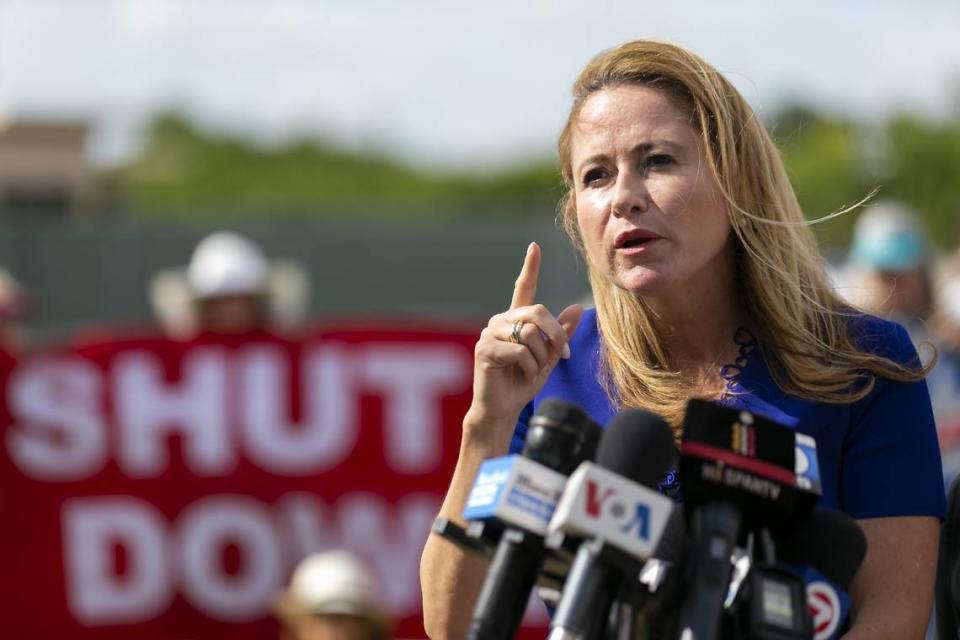Say what? Cuban-American Republican commissioners reject Cuban family reunification | Opinion
Mark this day on the political calendar: Nov. 19, 2019.
You could explain what went down at the Miami-Dade Commission meeting Tuesday as pure partisan politics — and it was — but given our place in this country as a uniquely successful city of refuge, particularly for Cubans, the layers of subtext were surreal.
After decades of addressing U.S.-Cuba politics from the dais, Cuban-American Republican commissioners rejected a resolution in support of a bill in Congress that would restore the Cuban Family Reunification Program.
The very idea that Cuban-American politicians would deny other Cubans the opportunity to be reunited with loved ones in the United States is repugnant at its core.
Wasn’t it supposed to be the evil Castro brothers’ job to keep our families separate?
That ironic twist alone should have tamed the partisan political circus in a supposedly non-partisan governing body.
Miami-Dade commission rejects Democratic bill to help reunite Cuban families
But HR4884 is sponsored by U.S. Rep. Debbie Mucarsel-Powell, a Miami Democrat born in Ecuador who unseated the Cuban-American Republican incumbent and has championed immigrant causes. Four other Florida congressional Democrats have signed on as co-sponsors, but not yet any Republicans.
The bill would expedite the applications of Cuban relatives of U.S. citizens, which have been in limbo since the dismantling of the U.S. Embassy in Havana after American and Canadian diplomats and staff reported mysterious neurological illnesses.

Commissioners were supposed to vote on a symbolic resolution to voice support for suffering Cuban families.
In refusing, commissioners Rebeca Sosa, Esteban “Steve” Bovo, and Javier Souto laid bare the fissures between them and the evolving, diverse Cuban community they serve.
Here were old-timers — who enjoyed for some 60 years U.S. immigration policy privileges no one else had — denying the same right to family reunification for Cuban-born U.S. citizens who face unprecedented obstacles put in place by anti-immigrant President Donald Trump.
“This smacks of D.C. politics,” said Bovo, a chief critic from the dais of President Barack Obama’s Cuba policy, as if he didn’t run with the Republican congressional contingent from South Florida and hadn’t ever peddled their issues and points of view before the commission.
“The pain of the Cuban people I have never used for politics,” said Sosa, who also wasn’t shy about slamming Obama policy or anything else that smacked left of the hard-line on Cuban issues from her county post.
“Not our jurisdiction,” said Souto, acknowledging how he has been criticized for speaking out about “federal politics.” A chronic Cuban issues campaigner who touts being a veteran of the Bay of Pigs invasion, he only makes exceptions for Republican policy he agrees with.
Throughout their speeches, the commissioners made clear they agree with Trump’s isolation of Cuba and his immigration policies, even if they didn’t say his name. They spun the theory that facilitating family reunification “just appeases the Cuban government,” as Bovo put it, and “releases the pressure valve.”
It’s a particularly risky position for Bovo, who is running for mayor.
With his rejection of family reunification he may be pleasing the segment of his Hialeah base that rejects newcomers, but he’s leaving without representation the new voting-age Hialeah. He should check who’s selling in the city (heirs of a passing generation) and who is buying and renting (Cuban newcomers).
Oh, the hypocrisy of the commissioners’ speeches ran deep on so many levels.
They fled Cuba, but they expect others to stay behind to slay the fire-breathing dinosaur of communism.
They reject mixing county policy with foreign issues, when it has been their trademark since they first ran for office.
During the Obama years of engagement with Cuba, in fact, there wasn’t a single aspect the Cuban commissioners were shy about addressing through county legislation.
They tried to keep the cruise ships from using PortMiami to sail to Cuba. They demanded that there be no Cuban consulate opened here, the place in the United States where people would get the most use out of one. The mayor, knowing how they feel, forbid the Zoo Miami ambassador from establishing an official relationship with Cuban counterparts.
And on Tuesday, they turned the political discussion on a merely symbolic resolution into such a spectacle that chairwoman Audrey Edmonson immediately proceeded to coax Commissioner Daniella Levine Cava, who had sponsored it, to withdraw it.
Edmonson argued that, on issues concerning the Cuban community, the wishes of the Cubans on the commission should be respected the way the African-Americans’ are when it comes to racial sensitivity. Because this is how we parcel out votes in this town and keep the peace, as if all Cubans and blacks subscribed to monolithic one-way thinking.
Grow up, Miami-Dade commissioners.
Cava, who also is a mayoral candidate, wanted to defer the resolution for further study, but Edmonson insisted on withdrawal.
In the end, the vote to reject the Cuban Family Reunification Program was unanimous.
And with that, commissioners sent a loud message from the comfort of their American democracy to Cubans fleeing the island: We don’t want you here. Stay and fight our war.
Shameful.

